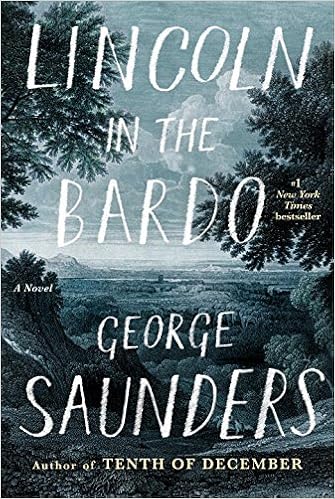 This
experimental novel puzzled and frustrated me at first but I adapted to its
style and in the end was so very happy I had persisted. It is definitely a book worth reading.
This
experimental novel puzzled and frustrated me at first but I adapted to its
style and in the end was so very happy I had persisted. It is definitely a book worth reading.
Eleven-year-old
Willie Lincoln, son of President Lincoln, died in 1862. The author imagines him trapped in bardo, a
transitional world between life and the afterlife. Willie is not alone; many people are in bardo
with him – people who have died but who are in denial and are unwilling to complete
their journey to the afterlife. Willie
remains in bardo because of his father’s love and grief; his father comes to
the cemetery to mourn and promises to return, and Willie wants to be there when
he does. It is imperative that Willie
leave bardo because “the architect of this place has, for reasons we cannot
know, deemed that to be a child and to love one’s life enough to desire to stay
here is, in this place, a terrible sin, worthy of the most severe punishment.” A trio of spirits makes it their mission to influence
Lincoln to let his son move on.
It is the
book’s style which stands out at first.
There are two sections. The story
of the living, focusing on Lincoln at the time of his son’s death, is told via a
collage-like narrative. Quotations from
both real and invented primary sources are carefully arranged to describe events
and Lincoln’s reaction to Willie’s death.
What is often emphasized is the contradictory elements; for instance,
Lincoln’s eyes are described as dark grey, gray-brown, bluish-brown,
blueish-gray, and blue, and he is described as “the homeliest man” and “the
ugliest man” and “the handsomest man” depending on the observer.
The story
of the bardo is also told from multiple perspectives. roger bevins III, hans vollman and reverend everly
thomas are the main narrators, but numerous other voices are heard as
well: a soldier, a murderer, a rape
victim, an alcoholic couple, a pickle merchant, a disgraced clerk, slaves,
etc. Again, the words of these bardo inhabitants
are strung together like the quotations are assembled in the other
section. These speakers are often
physically deformed, their disfigurements representing their failings, desires
or pre-occupations when they were alive.
For example, a man who was killed just before consummating his marriage
has a huge erect penis. They represent
the aspirations and disappointments of ordinary people; frequently, they focus
on missed opportunities. What these
speakers also share is an unwillingness to accept their death. They have a number of euphemisms for their
condition; their coffins, for instance, are “sick-boxes.”
What
emerges most strongly from the book is the portrayal of President Lincoln. He is shown as a thoughtful, dignified man
burdened by a terrible personal grief but also by the grief of the nation
because of the Civil War. At one point,
he is described as “the saddest man in the world” and when he mourns his son he
becomes “a sculpture on the theme of loss.”
He comes to realize that it is grief and loss that unify all
mankind: “His mind was freshly inclined
toward sorrow; toward the fact that
the world was full of sorrow; that everyone labored under some burden of
sorrow; that all were suffering; that whatever way one took in this world, one
must try to remember that all were suffering
(none content; all wronged, neglected, overlooked, misunderstood), and
therefore one must do what one could to lighten the load of those with whom one
came into contact; that his current state of sorrow was not uniquely his, not
at all, but, rather, its like had been felt, would yet be felt, by scores of
others, in all times, in every time. . .”
Of course,
it is not only Willie that is in bardo. Lincoln,
like any person grieving the loss of a loved one, is also in a transitional
phase, between his former life in which Willie lived and the next phase after
he comes to terms with his son’s death, accepting that his son “came out of
nothingness, took form, was loved, was always bound to return to nothingness.” Lincoln is described as “An opening book. That had just been opened up somewhat
wider. By sorrow.” He realizes that “in this state, he could be
of no help to anyone and, given that his position in the world situated him to
be either of great help or great harm, it would not do to stay low, if he could
help it.” All that is missing during his
epiphany is the “always bone-chilling, firesound associated with the matterlightblooming
phenomenon.”
This is a
book I may re-read. I’m certain there is
much that I missed, especially at the beginning when I was impatient with the style. I guess even readers may initially find themselves
in bardo until they embrace the unusual form.
Readers should be warned, however, that pathos permeates the book;
sections where Lincoln is shown mourning his son are heart-wrenching.
No comments:
Post a Comment